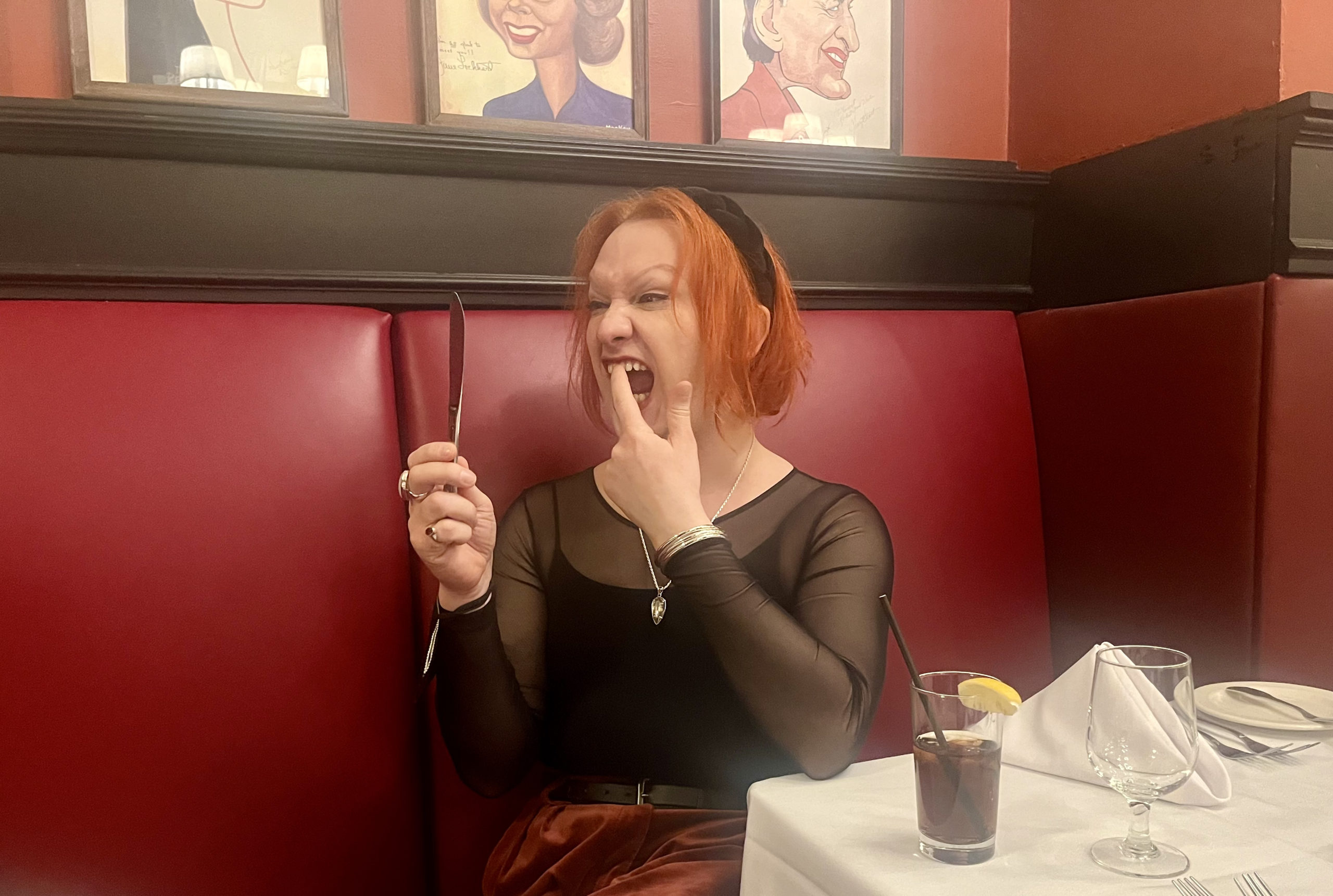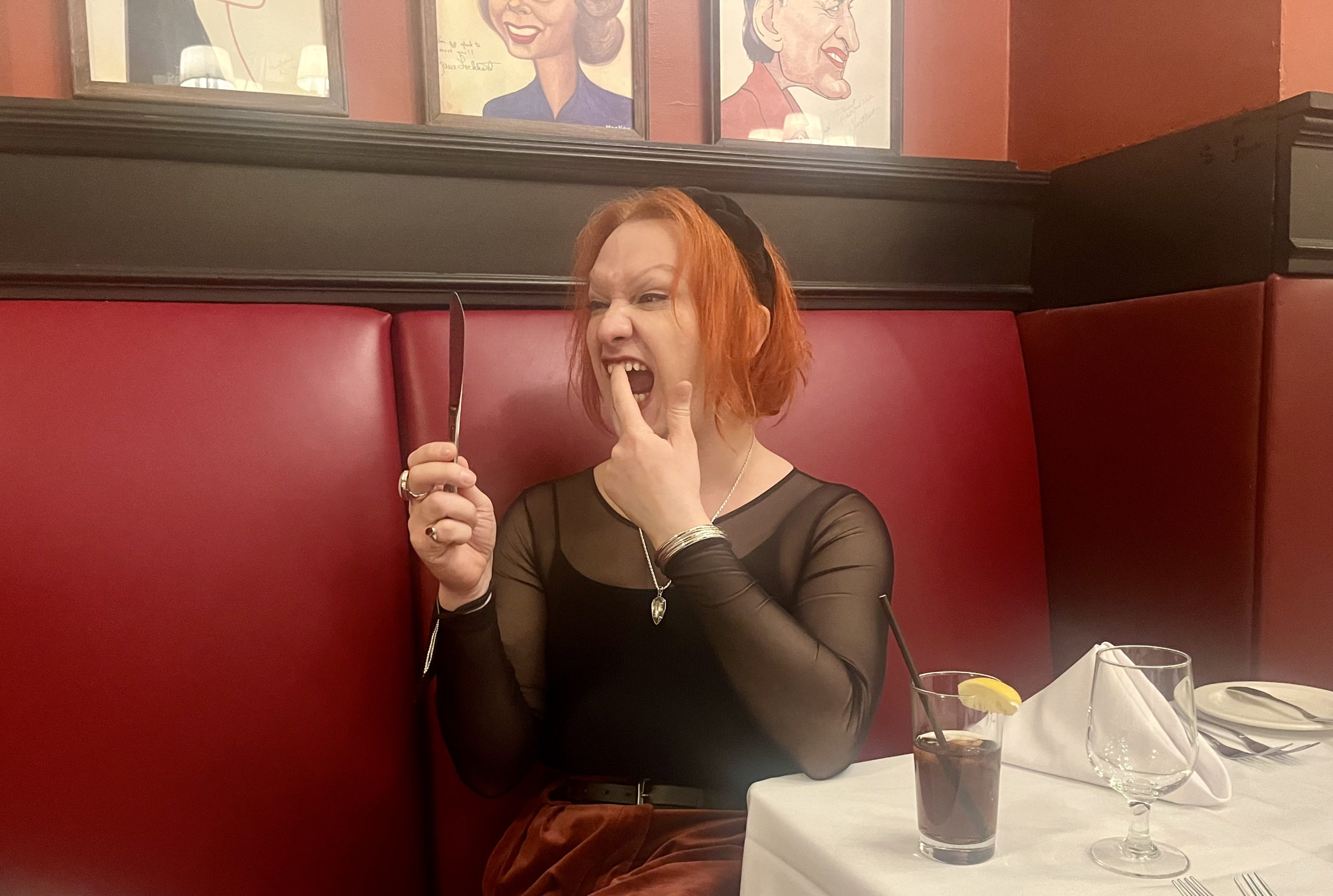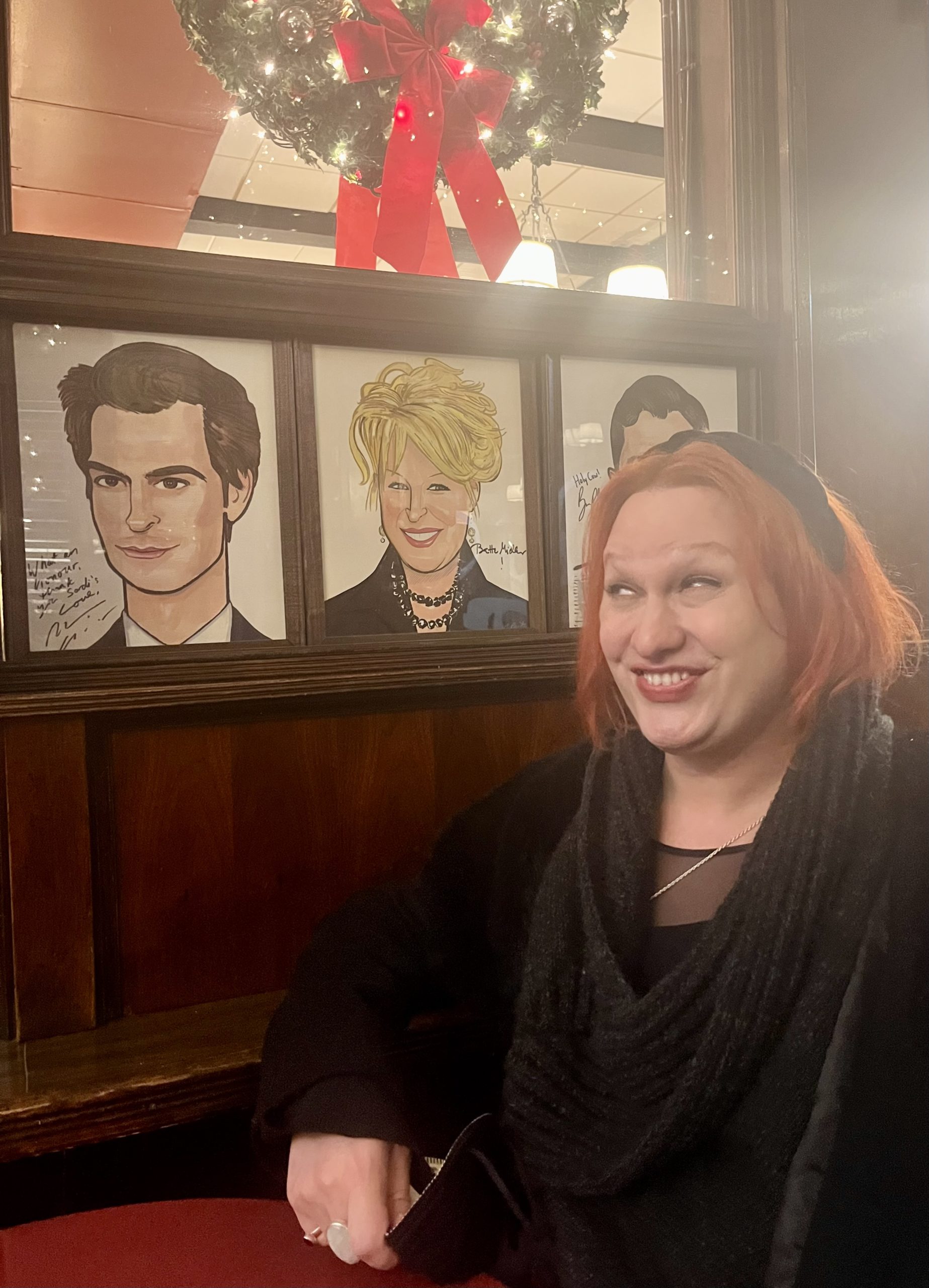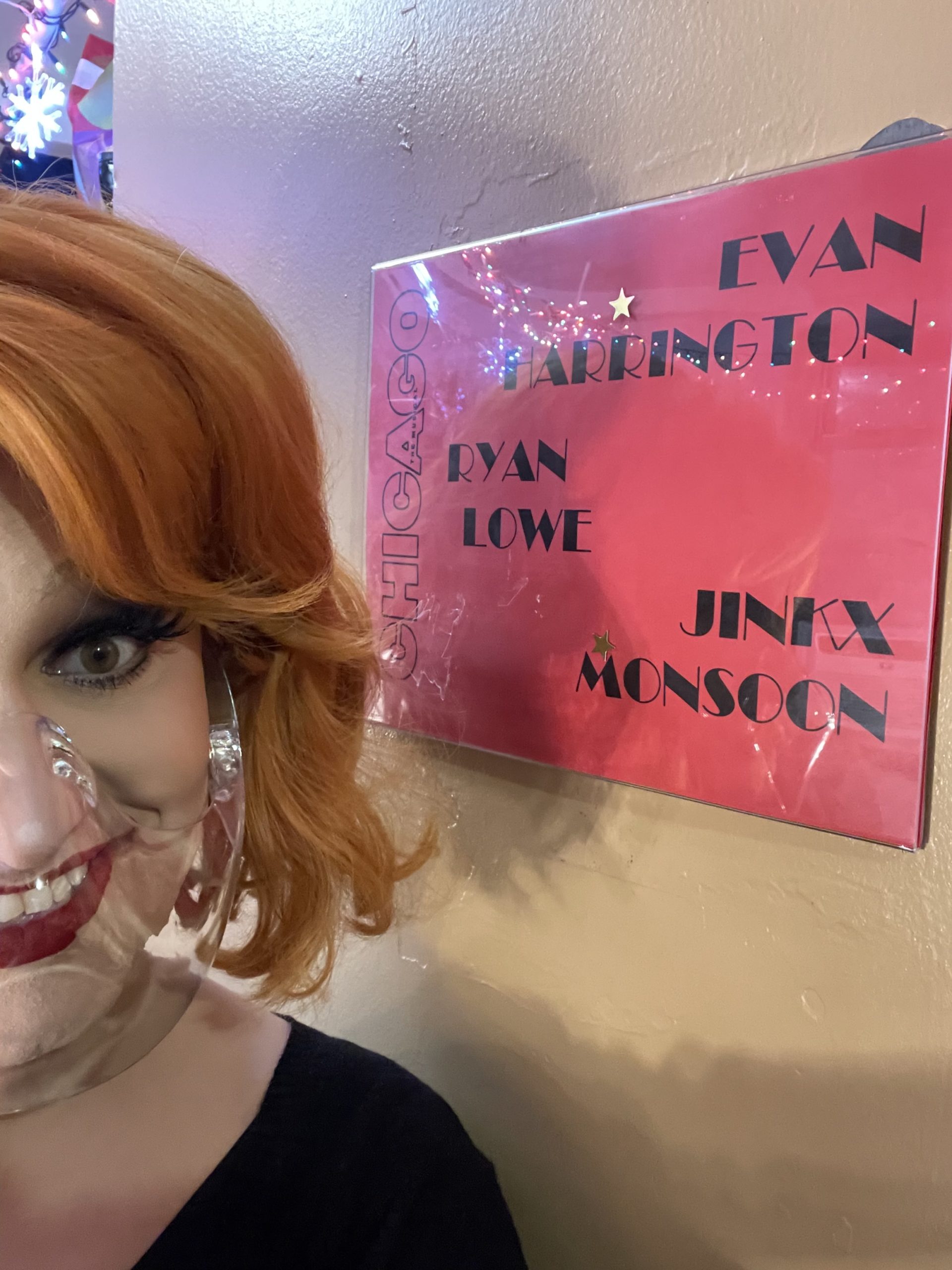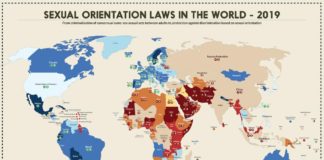When I get to Sardi’s, Jinkx Monsoon is sitting in a red leather booth in the back corner, surrounded on all sides by the some 1,200 caricature drawings of entertainers who’ve dined at the brassy institution name-checked in Rodgers & Hart’s “The Lady is a Tramp.” Wearing suede amber-colored pants, with a comically large BLT sliced into fours on the plate in front of her, Jinkx is hard to miss, radiating the sort of tickled glow you might expect from someone about to make her Broadway debut right down the street. Other patrons crane their necks to see her. But like a regular theater nerd, she’s looking for the restaurant’s portrait of Lucille Ball, whose ocean-blue eyes dart from their sockets.
Jinkx is coming from rehearsals for the Broadway revival of Chicago, in which she’ll spend the next two months starring as Mama Morton, the raunchy and exacting innkeeper of the Cook County Jail. It was the 2002 film adaptation, Jinkx explains, that first moved her to perform in drag. The casting is both a stroke of genius and the first of its kind; no drag artist has ever portrayed Mama Morton on stage. But to watch Jinkx triumph on RuPaul’s Drag Race in character as a lecherous liquored-up divorcée is to know her reverence for Chicago, a story of systemic greed of corruption where women are permitted to be as wily and sordid as the men who first screwed them over. “Chicago,” Jinkx says, “is all about who has power and who doesn’t have power.” Days before opening night, she talked about her struggles with imposter syndrome, the show business experiences informing her version of Mama Morton, and what she’ll do if she catches a cell phone in the audience. “If you want me to remember you for good reasons,” she warns, “don’t try it.”
———
JAKE NEVINS: Hey, Jinkx. How are rehearsals going?
JINKX MONSOON: Rehearsals are going really, really wonderfully. I have moments where it feels very surreal, because I’m working with Rob [Bowman] and David [Hyslop], who have worked on this show for so long. So I will reference the Bebe Neuwirth and Ann Reinking revival production, which of course is the one that I’ve studied my whole life.
NEVINS: That’s the ’96 production, right?
MONSOON: Mhm. I’ll say, “I noticed that Bebe Neuwirth did this,” or “I noticed that Ann Reinking did this.” And Rob will go, “Yeah, well, Annie really felt like…” And I was like, “Oh.” I’m bringing this production up as my holy grail of Chicago, and everyone in the room worked on that production. Or I’ll say a legend I heard about Elaine Stritch. And someone will say, “Yeah, Elaine was like that.” And my brain wasn’t making the connection of, “These people were there.” I’m talking about people they know really well like they’re mythical figures and they’re talking about them as old friends. And that’s when my mind kind of gets blown.
NEVINS: It must feel surreal.
MONSOON: It does feel surreal at moments. But the way they treat me in rehearsal is like I’ve been here the whole time. They treat me with so much respect and trust and faith. And they’re honest with me when something isn’t working, or if I’m taking something too far in a direction that’s not quite the show. But there’s so much freedom, which is kind of incredible for a role that’s as established in a show that’s as established as this one, that they’re still letting me find ways to make this character very much my own, even though it’s been played by hundreds of different people around the world.
NEVINS: Queen Latifah, Mary McCarty, Marcia Lewis. I wonder what would even constitute going too far when it comes to Mama Morton.
MONSOON: What they’re letting me do with Mama is play her authentically to me, rather than me try to play an archetype that I don’t fit within. I can’t play a large, big-breasted black woman. And I wouldn’t try to. And because that’s what we know the role to be nowadays, that’s the challenge I’m facing. But since no one expects that from me, it opens the book up so much.
NEVINS: How so?
MONSOON: I think that when a movie of a musical gets made, that becomes the definitive performance that you get compared to. Or you get compared to the big names who’ve played it on Broadway. I am so different from anyone who’s ever played it before that I don’t run the same risk of being compared to some of those other iconic performances. No one’s expecting me to be Queen Latifah, so I don’t have to be Queen Latifah.
NEVINS: What was your earliest encounter with Chicago?
MONSOON: It was the movie. I remember watching Moulin Rouge and Chicago in the same year. And then immediately I was like, “I need to start doing drag.” I was 14 when I first performed in drag for a ballet performance. And then I was 15 when I started working at an all-ages nightclub in Portland as my after-school job on the weekends, was I would help coordinate the shows and plan the shows with the other performers. Eventually I started hosting shows, and I was performing every weekend through high school as a drag queen, unless I was in one of the school plays. So seeing Chicago and Moulin Rouge, I felt like, “Oh, these are the roles I’m meant to play in life. But they’re women, so I have to start doing drag.”
NEVINS: Easy enough.
MONSOON: “Well, I’ll just start doing drag.” And the reason why that decision was so easy for me to make is, as it turns out, I’m a transfemme, non-binary human being. And drag was my way of finding that out within myself, as it is for many, many dolls in our industry. I always knew I was well-suited for female roles, so I knew I had to start practicing being a woman if I was going to play those roles someday.
NEVINS: Did you audition for Chicago? Or was it a direct offer?
MONSOON: They called me in to audition for it, so they were interested. It was definitely one of those fortuitous moments, but I still auditioned. It was still very traditional in that sense. I went in and met the team and told them my ideas for the role and auditioned. And then I heard from my agent that everything was very positive. But it took about a month before it was like, “Yep, this is happening.” So I kept it to myself. It was just a month of crossing my fingers.
NEVINS: What’d the audition entail?
MONSOON: I sang “When You’re Good To Mama” twice. And I did one of the scenes. It was a very traditional audition, but I could feel the energy in the room like, “They’re liking what I’m doing.” A long time ago when a production was being developed in Seattle before it went to Broadway, I was up for one of the supporting roles. And I had knocked out everyone in casting, every stage of the audition everyone loved me, until they brought in the director. And the director watched me do the scene and went, “Could you play it less like a nerd?” And I was like, “I didn’t know I was playing it like a nerd.” And then I did the scene again and he goes, “The character’s not a nerd.” I’m like, “Is this just coded language for, I’m playing it too gay?”
NEVINS: Gays are nerdy.
MONSOON: In the moment, there’s just no other way to describe it other than I felt he was saying, “You’re playing the role too gay.” And instead of saying that, he said “nerdy.” So I know what it feels like when someone’s not buying what you’re selling.
NEVINS: What was the show?
MONSOON: I can’t say, because who knows what’s happening next.
NEVINS: He might have made a huge mistake.
MONSOON: Yeah. Maybe he’ll read this article and realize who I’m talking about.
NEVINS: That’s why we’re doing this, for you to exact vengeance on directors who’ve slighted you.
MONSOON: Thank you so much.
NEVINS: I’m glad this is your Broadway debut, though, because so much of Chicago specifically seems to animate your sensibility as a drag queen, especially that sexed-up MILF character you sometimes play.
MONSOON: It’s because Chicago taught me how to do drag at an early age.
NEVINS: What did it teach you?
MONSOON: Well, I think a big part of it is that Chicago is a female-led show. Chicago is all about who has power and who doesn’t have power. The people who don’t have power have to find different ways to gain the upper hand. And what I love is seeing different female archetypes figure out their way through life when the cards are stacked up against them. I see Mama as one of those survivors. She found a way to not only survive in a world that’s set up against her, but she’s actually a woman with power when that’s extremely hard to come by. And it’s not her sexuality, it’s not even really her position at the jail, it’s not even that she’s the warden of the jail. It’s that she has figured out how the world works: reciprocity. Mama is this woman who has given up on any grandiose dreams and is just finding a way to make the system work for her.
NEVINS: Are you drawing on any experiences of yours professionally or personally to channel that?
MONSOON: Well, the motherly part of the character comes naturally to me.
NEVINS: You’re mother.
MONSOON: I mean, ask any of my friends, I’m Mama. And my house is the house where people come to recuperate from heartbreak. That was the kind of house my grandmother provided, and my grandmother was Mama. And when she passed away, it skipped my mother and my aunt and went straight to me. I realize I just said Mama’s given up on grandiose dreams, but she does actually have a grandiose dream, which is to manage the careers of Roxie and Velma. So the way I see it, Mama has learned to operate more like a man in this world to get power. And what I’m pulling into this character is some of the more toxic relationships I’ve had with producers.
NEVINS: Give me an example.
MONSOON: Let’s just say there’s a moment where Mama slaps Roxie on the butt. And it’s a tactic. There are producers who have done that to me before. And there were times in my life where I didn’t think anything of it. I just thought, “This is how producers and performers interact. This is part of being a performer.” And then it happened again recently and I realized I actually don’t want that to be my story anymore.
NEVINS: What’s changed that you now recognize that as being unacceptable?
MONSOON: It’s because we’re having the conversation as a society. And I don’t say this to say that I’m ahead of the curve on these conversations, because obviously I hadn’t been thinking about it then. I knew it was bad for a producer to do that to a woman, but I didn’t think the same applied to me because I was a drag queen. And what it really is working with people like DeLa [BenDeLaCreme], who is not only my collaborator and cohort in our holiday show, but she’s also my director and my producer. And this is a person who has so much respect for me as a friend, and respect for what we do as drag queens and would never think of demeaning me in that way. Working with her for the last five years made me realize this isn’t par for the course, I don’t have to let a producer talk to me like that. I felt a little guilt and shame around that, like I’d encouraged it. DeLa was like, “You didn’t encourage it. You thought that’s part of being a starlet.” I thought I was Joan Crawford and he was showing me off to other producers. It made me feel like I was one of his prized fillies, not a performer he respects.
NEVINS: It sounds like DeLa has a little Mama Morton in her too.
MONSOON: If you’re asking me, DeLa’s a Velma. But she could play Mama.
NEVINS: I know you’re a lady of rituals. How are you handling the rigor of Broadway rehearsals?
MONSOON: Well, what I’ll say is… Wait, let me chew this.
NEVINS: Yes, chew. You haven’t touched your BLT.
MONSOON: [Eating]. I still feel like I’m in the settling in phase. But I’ve got to say, the way to get the best work out of me is when I don’t have to travel. This is something I’ve been hoping and plotting and scheming for since childhood, essentially. Everything in my career has been about how I could possibly catch the attention of the right person who might take a chance with me on Broadway playing a cis, female role. So to finally be here, I feel like my audiences will understand. In 10 years I’ve canceled maybe two shows, and one was because of travel and one was because the deal fell through. I don’t cancel shows. And I just knew that my audience would understand that this is my dream coming true. I pulled out of any work that would have me leaving New York for the duration of the run, because rarely do I get to give something this much focus. So it’s really nice for the first time in 10 years to be like, “This is the one thing I’m doing for the next three months.”
NEVINS: And you didn’t have to do much scheming at all.
MONSOON: As a highly anxious Virgo it’s my MO to pick things apart until I’ve convinced myself that they felt bad for me. Or no one else was available. I have a tendency to convince myself that I don’t deserve what’s happening. Or that I really need to grovel because it could be taken away at any moment. And I’ll tell you what’s changed for me is almost four years of sobriety, therapy, witchcraft. Confronting issues head on rather than letting them fester and turn into resentment. And now I can see very clearly, these opportunities are coming because of the work I put in. It was really hard for me to see that before. And I don’t know what’s changed other than All Stars Seven, which was one of the hardest things I ever did. But when I watch it, I feel really accomplished because I’m like, “I put myself through a huge rigamarole and now I get to reap the benefits of that.” It’s different from Season Five, because I was so green and I was so easily convinced of my own imposter syndrome.
NEVINS: Imposter syndrome, basically.
MONSOON: Drag Race Season Five, I was so green and so easily convinced of my own imposter syndrome. But I love the work that I do, so it’s never been about the money. What I found is the more I put the work first, success started to follow. It was when I was trying to do it the other way around, like, “What do I have to do to be successful?” That was holding me back. But then I started thinking, “What do I actually want to be doing? And what’s going to make me feel the most fulfilled as an artist?”
NEVINS: What did that look like, trying to reverse-engineer it?
MONSOON: It looked like me forgetting why I started doing drag in the first place. And then I stopped writing work that I thought people wanted to see based on who they got to know on TV, and went back to writing the way that I had written before I had ever done Drag Race, which was filthy, which was angry. I mean, Jinkx the human being is the sweetheart they depicted on Season Five and through much of All Stars Seven. A happy, mindful, thoughtful person who tries to be kind to everyone. Jinkx Monsoon the character is a fucking narcissistic, selfish, drunken, sex-addicted bitch. She’s fighting for progress, but in the meanest possible way. And that got lost after Season Five, because I felt like everyone got to know the artist and not the character. So people came to my shows expecting to meet Jinkx the human, and when they met Jinkx the character they were put off. That made me feel like I was doing something wrong, like I was catfishing my audience. When I went into All Stars Seven, it was like, “I need to take this chance to show everyone the character of Jinkx Monsoon, because they already know the artist.” And I was very candid with the production team. That was a huge turning point, because I felt like I no longer had to fight against the past.
NEVINS: And now fans respond to the campy MILF bitch version of Jinkx.
MONSOON: If you come to my show and watch me on stage and then meet me after the show, I’m going to seem like I have dissociative identity disorder. At the meet-and-greet, I’ll still crack jokes and give them what I think they paid for, but they’re going to get a genuine conversation with me. Whereas on stage, if they tried to heckle me, they’re going to get yelled at. It’s what people love the most at my shows, when I tear into an audience member.
NEVINS: Well, Broadway is the perfect place to do that. Just ask Patti Lupone.
MONSOON: Hopefully, we won’t need to.
NEVINS: What will you do if you see a cell phone?
MONSOON: Well, every once in a while you want a picture to leak so people will talk about it. But I’d like to think that if there came a moment that called for me to do anything, I could deliver my go-to heckler line as Mama and it would still work in this context.
NEVINS: What’s that?
MONSOON: “Oh, I’m sorry. This is a scripted show and none of you have lines.”
NEVINS: That’s good.
MONSOON: Anyone reading this, please don’t think you’re going to be the one. If you want me to remember you for good reasons, don’t try it.
NEVINS: I know you’re a stoner. Are you smoking through the rehearsal process?
MONSOON: At the end of my days, yes.
NEVINS: That’s prudent.
MONSOON: I’ve cut out alcohol. I’ve cut out nicotine. I’ll cut out weed when I’m dead. But I will say, because I am being mindful of my voice, it’s typically edibles or just one joint at the end of the day. I’m not the high-functioning stoner I once was. I mean, I am a high functioning stoner, but I don’t need weed to get me excited about my day. Witchcraft, therapy, and mindful medication do that.
NEVINS: Who’s coming to see you? Now’s the time to name-drop.
MONSOON: My family is making the trip to New York from Portland. Also, my opening night is my brother’s birthday. I call him the “straight brother” because I have two brothers, a queer brother and a straight brother. I was so worried like, “I hope I don’t steal this thunder, it’s his birthday.” But then he surprised me by saying, “Oh my god, I get to celebrate my birthday by watching you on Broadway.” And I was like, “Really? That’s how you feel?” And he said, “Seeing you on Broadway has been my life’s dream.”
NEVINS: That’s very touching.
MONSOON: It was one of the sweetest things the straight brother has ever said to me. And then all of my coupled friends, my friends who are in committed relationships, are coming for Valentine’s Day. I didn’t think my friends would want to celebrate their Valentine’s Day coming to see me, but they are.
NEVINS: I mean, what a great cure for imposter syndrome. Everyone in your life coordinating these milestones around your Broadway debut.
MONSOON: It’s very, very sweet.
NEVINS: Break a leg, Jinkx.
MONSOON: Thank you so much.

